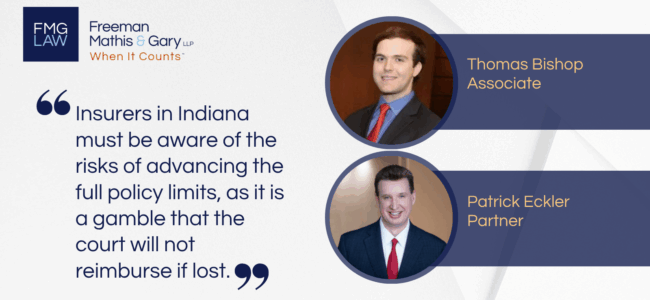BlogLine
“All-in” advancement? Insurer’s advancement gamble backfires in the eyes of Indiana Appellate Court
5/27/25

By: Thomas T. Bishop and Donald Patrick Eckler
The Court of Appeals of Indiana recently highlighted the risks of insurers advancing payment in Shelter Mutual Insurance Co. v. State Farm Mutual Automobile Insurance Co. The case arose after Lee Naylor, insured by Shelter, was injured in a car accident caused by Mary Siener, State Farm’s insured. State Farm offered its policy limit of $50,000 to settle, and Shelter advanced the full policy limit to Naylor to preserve its subrogation rights under Indiana Code § 27-7-5-6.
At trial, a jury awarded Naylor only $14,000 – a loss far less than what Shelter expected when it advanced $50,000 to its insured. Shelter then demanded full reimbursement from State Farm, arguing promissory estoppel applied based on State Farm’s settlement offer. State Farm reimbursed only the $14,000 judgment. Ultimately, both insurers moved for summary judgment. The trial court granted summary judgment in favor of State Farm.
The Court of Appeals of Indiana affirmed the trial court’s finding in favor of State Farm. The appellate court held that Shelter’s subrogation rights under Indiana Code § 27-7-5-6 were limited to the proceeds of the judgment ($14,000), not the full $50,000 advancement. The court rejected Shelter’s promissory estoppel claim and distinguished it from Farm Bureau v. Allstate—a case where reimbursement was enforced due to timing issues that cut off subrogation rights. Here, Shelter’s rights were preserved and fully exercised. The court emphasized that both insurers took a calculated risk, but “Shelter took that gamble and lost to the tune of $36,000.”
Insurers in Indiana must be aware of the risks of advancing the full policy limits, as it is a gamble that the court will not reimburse if lost.
For any questions or further clarification, please contact Donald Patrick Eckler at patrick.eckler@fmglaw.com, Thomas T. Bishop at thomas.bishop@fmglaw.com or your local FMG attorney.
Information conveyed herein should not be construed as legal advice or represent any specific or binding policy or procedure of any organization. Information provided is for educational purposes only. These materials are written in a general format and are not intended to be advice applicable to any specific circumstance. Legal opinions may vary when based on subtle factual distinctions. All rights reserved. No part of this presentation may be reproduced, published or posted without the written permission of Freeman Mathis & Gary, LLP.
Share
Save Print
